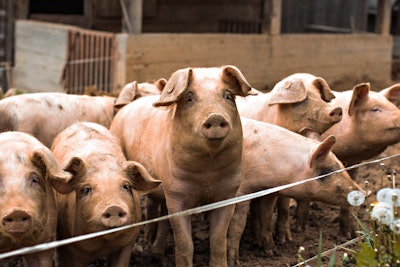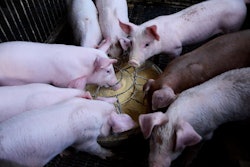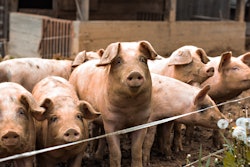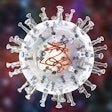
In mid-July, presence of the African swine fever (ASF) virus was confirmed at a pig farm in the northwestern province of Gyeonggi.
The discovery came after an unexplained spike in mortality in the herd, which comprised around 2,500 swine, according to the South Korean agriculture ministry.
Immediately after the outbreak, a 48-hour standstill was put in place by the authorities. This covered workers and vehicles at pig farms, slaughterhouses and feed mills in the county — Paju — and four adjacent counties in the same province. Intensive disinfection was carried out on neighboring farms and roads.
The next day, the ministry reported that 57 pig farms within 10 kilometers of the outbreak had been inspected, along with another 118 farms with an epidemiological connection to it. More than 1,000 farms that use the same slaughterhouse underwent clinical examinations, and approximately 440 vehicles were subjected to cleaning and disinfection.
This is the fourth ASF outbreak among the South Korean domestic pig population so far this year. The previous three affected premises were also located in Gyeonggi, but in a different county (Yangju). The most recent of these started in mid-March.
So far in 2025, the four outbreaks have directly impacted more than 17,800 swine in South Korea, according to Pig People.
Since ASF first arrived in the country in August 2021, 53 domestic herds have been infected, directly involving more than 199,000 pigs. The same source puts the number of confirmed cases in the wild boar population at 4,254 — a figure unchanged since mid-June.
'Drastic action' called for in Vietnam
So far this year, 514 ASF outbreaks have occurred across 28 of the Southeast Asian nation’s 34 provinces/cities, reported VietnamPlus on July 18. Citing data from the agriculture ministry, the source puts the resulting pig losses through mortality and culling at more than 30,000.
With 248 active outbreaks — usually defined as cases confirmed within the previous 21 days — in 20 communities, there is a considerable risk that the infection will spread further.
Prime Minister Pham Minh Chinh has called for all municipal and provincial leaders to take responsibility for ASF prevention in their area.
Surveillance of pig herds needs to be intensified, and swift action is required to deal with new outbreaks, including the culling of animals suspected of being infected. Authorities are called on to prevent unauthorized transportation, movement, and sale of pigs and pork products. They are also required to offer more guidance to farmers on disease prevention.
While the Ministry of Agriculture and Environment will lead the National Plan for ASF Prevention and Control, the source reports additional involvement by the ministries of national defense, and industry and trade. The nation’s media are tasked with raising awareness among the population on the dangers of ASF, disease prevention and vaccination.
ASF developments in India, Malaysia
Last week, the scale of ASF outbreaks in the northeast Indian state of Mizoram was revealed.
Since the first cases in Lunglei district in 2021, close to 68,172 pigs have died of the disease, and more than 51,300 have been culled, reports IndiaTodayNE. Financial losses have mounted to more than INR9.6 billion (US$112 million) over this period.
After a hiatus of several months, ASF returned to Mizoram in March. Since then, the source reports that 5,871 swine have died of the disease there, and a further 1,942 have been culled.
The virus continues to spread in the state, despite disease control measures. It has repercussions on food security and the rural economy as pig farming is the main source of income for many Mizoram families.
This month, it was reported that ASF had returned to the Western Malaysian state of Penang.
Latest update from New Straits Times reports that no further outbreaks have been confirmed since July 12.
While monitoring continues, the number of affected farms remains at three. The source reported in recent days that a total of 244 infected carcasses have been destroyed, and 578 swine have been culled.
In its official notification to the World Organisation for Animal Health (WOAH), the Malaysian animal health agency has confirmed the three ASF outbreaks.
All affected premises are located in the same district of Penang. Each with herds of between 522 and 1,922 pigs, a total of 3,244 animals have been directly impacted by the disease in this state since July 9.
Prior to these latest outbreaks in Penang, Malaysia’s most recent ASF cases started in February in Selangor state, according to WOAH reports.
European domestic pig ASF outbreak total passes 300
With five states recording new cases in this population over the past week, the outbreak total in the region’s domestic swine stands at 303.
These have been logged by 12 countries, according to the Animal Disease Information System from the European Commission (EC; as of July 16). Through this database, the EC monitors cases of listed animal diseases in European Union member states and selected adjacent countries.
Of the 2025 ASF outbreaks to date, 199 were recorded in Romania. Moldova’s total is the next highest at 36.
During the whole of last year, 16 countries logged a total of 764 outbreaks in this category with the system.
The database covers 14 new outbreaks in Romania reported in the period July 10-16, three in Croatia, two in Poland, and one in each of Bosnia-Herzegovina and Ukraine.
Notifications to WOAH offer more detail on recently reported outbreaks.
Latest reports from the Romanian veterinary authority cover 26 recent outbreaks in 11 counties across the country. One involved the discovery of an infected pig carcass in a public area. All the others involved small backyard herds, each comprising between two and 42 animals.
Bringing the nation’s total ASF outbreaks this year to 18 were two more affected premises in Croatia this month. Both involved backyard herds in northeastern districts where previous infections have been reported recently.
In adjacent Bosnia-Herzegovina, two new outbreaks involved non-commercial herds in different districts of the Federation of Bosnia-Herzegovina region.
Poland has recorded five outbreaks of ASF involving domestic pigs over the past month, according to the chief veterinary inspectorate.
Latest — and largest — of these involved a premises with approximately 7,455 pigs in the northwestern province of West Pomerania. It was the first in this population in the province since September 2024.
Starting in the first week of July, Moldova’s most recent ASF cases were in a backyard herd, according to the WOAH notification. It impacted four animals located in the central district of Calarasi.
More cases in Europe’s wild boar
A total of 7,187 ASF outbreaks in this category have been registered by 18 countries so far this year, according to the EC system (as of July 16).
Over the previous week, seven countries had logged a total of 106 new cases with the database. This figure includes 56 in Poland, 15 in Latvia, 13 in Italy and a few cases in each of Germany, Estonia, Lithuania and Romania.
For the year to date, Poland’s total in this category is the largest at 2,472, followed by Germany (1,659) and Latvia (690).
In Germany, the most recent region to confirm its first cases of ASF is the western state of North Rhine-Westphalia.
Since that confirmation in mid-June, the state’s government reports that approximately 40 wild boar have tested positive for the ASF virus (as of July 18). All were found dead in one of two adjacent districts, and in the core restriction zone I.
According to the same agency, construction has commenced of a series of fences in the two affected districts — Olpe and Siegen-Wittgenstein. The terrain is challenging — involving steep slopes and dense forest — requiring a variety of permanent and temporary fencing systems to be used. Within the core zone I, wild boar are being fed, and any carcasses are being discretely removed, with the view to containing the ASF virus and already infected animals in this area.
ASF has not yet been detected in the U.S. However, if the disease were to break out in the country, Congress has heard recently from expert witnesses how ASF would be brought under control.
View our continuing coverage of the global African swine fever situation.
















